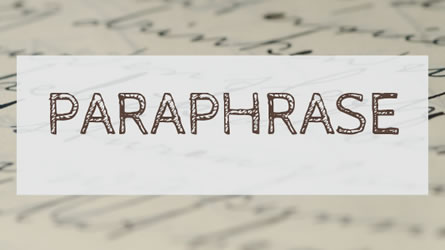 Building your VO expertise shouldn’t stop when you leave class. Here are three tips for practicing your VO performance!
Building your VO expertise shouldn’t stop when you leave class. Here are three tips for practicing your VO performance!
1. Learn the art of paraphrasing.
Being an excellent voice actor means you know how to get to the heart of the copy writer’s message. We turn written word into spoken word and make it sound natural. In order to do that, we need to understand what the heck it is we’re talkin’ about!
Sure, we want to tell a great nuanced story, work our exceptional mic technique, and be mindful of how we ‘sound’, but are you ever guilty of focusing too much on how your voice sounds and overlooking the key points the writer is making? (We’ve all done it!)
Remember in school, when your teacher asked you to summarize a book or a chapter in your own words? Paraphrasing, baby! As a voice actor, it’s critical to be able to understand the general message of the copy well enough that you can put it in your own words in a sentence or two—well enough that you can paraphrase it!
To paraphrase a script, ask yourself these questions: What’s the main objective of this script? What’s the big idea(s) the writer wants to drive home?
Then, flip the script over (so you can’t see it—no cheating!) and then say, in your own words, out loud, the general message that the writer is communicating. If you can’t say it in your own words yet, read it again until you can…
Boom! You did it!
Next, quickly flip the script back over and begin reading your script again out loud. What do you know? It sounds way more conversational and less announcer-y or read-y.
When you put the copy in your own words, you tap into a more conversational YOU. And that’s what producers want—you!
2. Fall in love with lead-ins.
Another great benefit to paraphrasing scripts is that you can use paraphrasing as a lead-in.
What’s a lead-in? A lead-in is an unscripted word or phrase you say right before you start reading a script. I describe it as a little performance “trampoline” you can use to bounce into your actual “script-reading.”
Holy cow does it help! It’s a miracle worker. Why is that? Well, when you start reading without a lead-in, sometimes it takes a sentence or two of reading before you find your stride or momentum—before you settle in to that script. If you add a lead-in, by the time you get to the first sentence of the script, you’ll nail it. This is super important, because do you know what the most important sentence of the script is?
You guessed it! The first sentence! How your first sentence lands on the ear will dictate whether or not that casting director or client will continue listening.
(Now, do me and yourself a favor and rock that read all the way through, but if you’re gonna stress over any part of an audition… make it the very first sentence. First impressions count!)
 Here are some lead-ins I use often:
Here are some lead-ins I use often:
1. If the vibe of a script is sassy or snarky I sometimes say, “Look.” Or “Listen up.” (with attitude) before I start reading the script. Identifying the attitude of a script really helps me find a good lead-in!
2. If it’s heartfelt, for example, maybe a children’s hospital, I say something like, “I care about you.” Or “I’m here for you” in a gentle, soft tone.
3. Read the copy direction out loud and then go right into the script. Let’s say the direction says they’re looking for a cool, fun mom voice, age 25-35. So, I’ll get in character as I say out loud, with attitude, “I’m a super cool mom, and of course I’m 28 years old! I drive the coolest mini-van on the market, and my brownies taste the best!” And then I’ll go right into reading the script! By then, I’m super into the copy and the character!
So, should you keep your lead-ins when you submit your audition file? That depends. Usually, I edit my more long-winded lead-ins out before submitting an audition, so make sure you leave in a little beat before the actual script starts so you can cut the pre-performance out.
But if it’s a small phrase or just a word or two and I like it a lot, I’ll leave it in. Why? Because it makes my read stand out! And that’s what we want when producers and casting directors are listening to our auditions!
3. Read out loud, read out loud, read out loud!
If you’ve heard me say it once, you’ve heard me say it 1,000 times…voice actors have to be impeccable readers. And I don’t mean reading to yourself! (We all sound amazing in our minds!)
 I’m talking about reading out loud. When you’re in that booth, you shouldn’t even be thinking about the fact that you’re reading. That skillset should feel effortless.
I’m talking about reading out loud. When you’re in that booth, you shouldn’t even be thinking about the fact that you’re reading. That skillset should feel effortless.
So how do you get to that effortless feeling? Read. Out. Loud. Read books, magazines, newspapers, your posts on Facebook, advertisements, ingredient labels on your food, and toothpaste and detergent—heck, read the billboards you pass driving to work! (Just don’t get carried away with that last one—safety first, folks!)
The more you read out loud, the better your reading skills will become when you’re on-mic performing. Soon, your reads won’t sound read-y at all!
Now, I’m not saying that you won’t ever trip up and have to do a pick-up—not at all! I do tons of pick-ups every single day. It happens! What you’re shooting for isn’t perfection (that doesn’t exist) but instead, you want to feel confident with your overall reading abilities.
So read, read, read some more, and then read again. Soon, you’ll forget you’re even doing it. And you will rock that mic! I can’t wait to hear it!
Loved the “lead-in” approach practiced in your Commercial Essentials class, Melissa. I plan to build a list of sample lead-ins as “go-to” examples to help lessen the anxiety of “think-of-something-quick”!